Need to stop thinking negatively about yourself? Want to know how to stop bad thoughts in your head?
Whether it’s the nagging voice telling you that you’re doing something wrong, or the judging voice telling you you’re not good enough, negative thoughts can pop into your head at any time.
Since I write and teach about fitness and health for women over 50, I get questions all the time about mindsets and how to change them.
More specifically, how to stop thinking negatively about yourself.
You see, people in general, and especially many women over 50, think a LOT of negative thoughts. About themselves, their bodies, their ability to control their eating, time, and mood.
If you find yourself wondering how to stop negative thoughts in your head, you’ve come to the right place!
By the time you’re done reading this post, you’ll understand what causes negative thinking patterns (and what they are), the effects of negative thinking, and 3 ways to stop thinking negatively about yourself.
So, buckle up, and let’s bust some negative thought patterns for good!

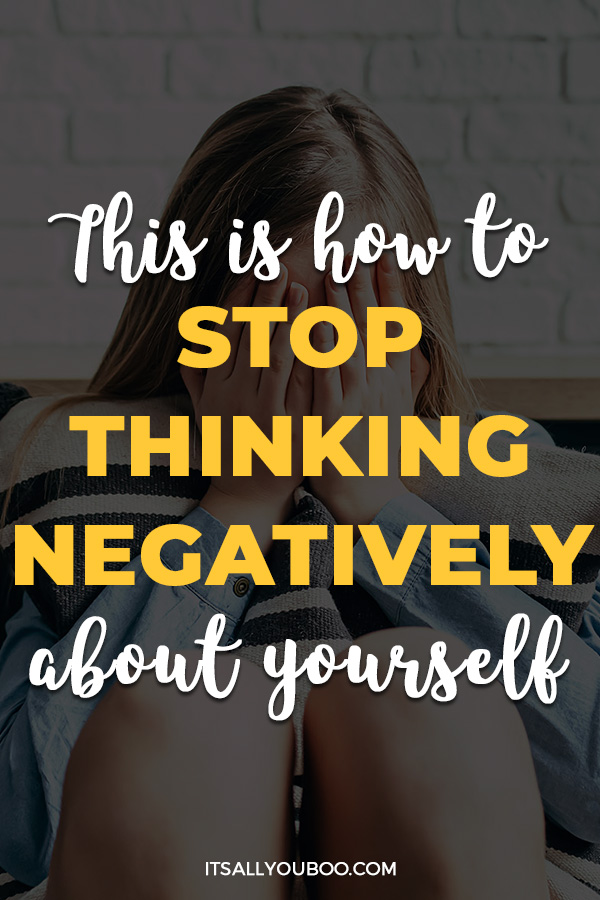
THIS POST MAY CONTAIN AFFILIATE LINKS.
IF YOU MAKE A PURCHASE FROM THESE LINKS, I MAY EARN A SMALL COMMISSION.
CLICK HERE FOR MY FULL DISCLAIMER STATEMENT.
What Are Negative Thinking Patterns?
Negative thinking patterns are those that your mind falls back to in times of stress, worry, fear, or even excitement. According to Verywell Mind, understanding your negative thought patterns is the first step in learning how to challenge and change them for a healthier mindset.
They’re not all bad, either. It wouldn’t be advantageous if your brain failed to alert you of danger, or if you didn’t weigh risks versus benefits for activities you planned to engage in.
But, because of evolution, and the dangers that ancient peoples had to contend with daily, the negative patterns are more prevalent in the human brain.
In addition, some individuals are more prone to negative thinking than others.
Not fair, I know. Especially since I happen to be one of those people!
👉🏽 RELATED POST: How to Stop Negative Self-Talk
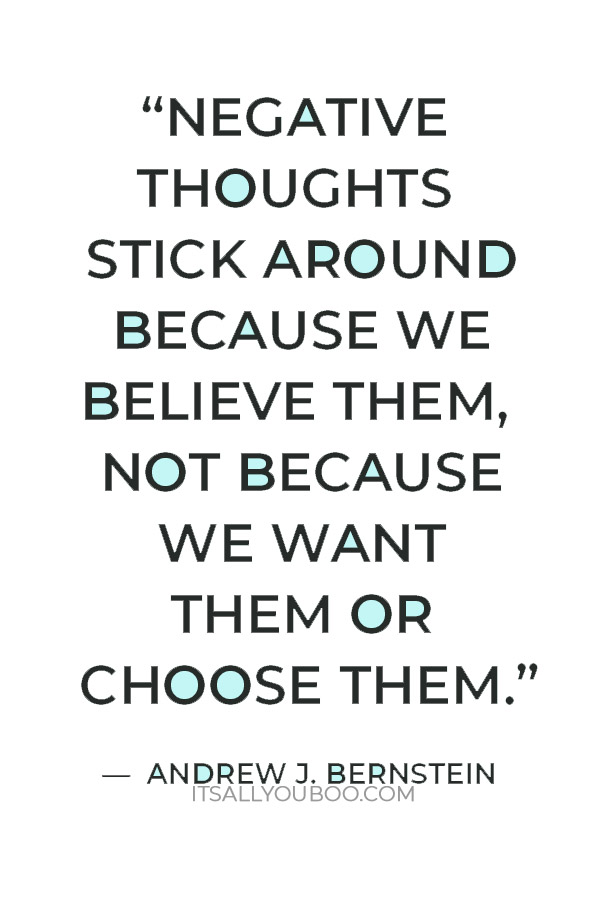
Some People Are More Negative Than Others
A gene study done by a University of British Columbia psychologist showed that a particular gene, the “ADRA2b deletion variant,” inclined some people more toward negative thinking.
Rebecca Todd, a psychology professor in the university’s Psychology Department said, “The findings suggest people experience emotional aspects of the world partly through gene-coloured glasses — and that biological variations at the genetic level can play a significant role in individual differences in perception.”
So, whew! At least it’s not necessarily your fault!
As an aside, when I was growing up (I was born in the mid-1950s) no one, and I mean NO ONE was talking about this sort of thing.
If you were a negative thinker, by golly, you should just buck it up! Stop worrying! There’s nothing to be afraid of! Why are you always so negative?
Those are admonitions I (and perhaps you) heard ALL.THE.TIME. I always felt small and stupid because I couldn’t stop! I mean, how are you supposed to do that?
It was never, ever helpful. It just brought more self-criticism, fear, AND negative thinking!
What Causes Negative Thinking Patterns?
Everyone thinks negatively about themselves at times. It only becomes a problem when it interferes with everyday life and stifles your goals and dreams — and that’s when seeking help from a mental health professional can be beneficial.
Contrary to what you may believe, negative thinking is perfectly normal.
As Dr. Russ Harris says in his excellent book, The Happiness Trap, “our minds did not evolve to make us ‘feel good…’ Our minds evolved to help us survive in a world fraught with danger.”
If negative thinking begins to affect your daily life, always seek medical advice from a qualified professional.
👉🏽 RELATED POST: Silencing Your Inner Critic
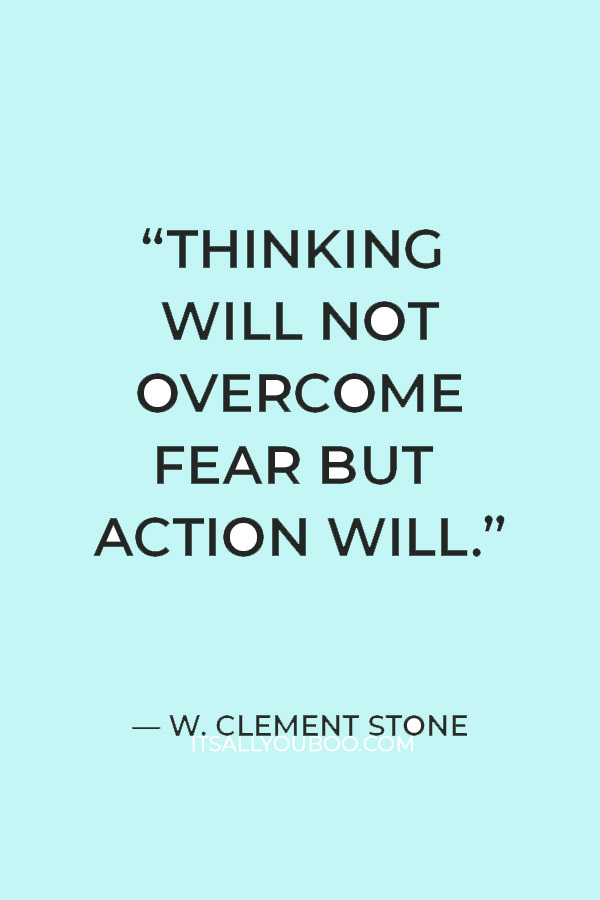
Think about that for a minute and let it really sink in. The more skilled our ancestors were at foreseeing and preparing for danger, the longer they lived, and the more likely it became that you would arrive centuries later.
We’re always on the lookout for danger, only now, of course, we don’t have the oft-cited saber-toothed tigers to worry about, or (usually) where we’ll find our next meal.
We’ve also evolved to live in packs or groups, so it’s likely you spend a fair amount of time thinking about how others accept or like you, which can sometimes lead to social anxiety or self-doubt.
You know, whether you measure up.
It’s no wonder you try to figure out how to stop thinking negatively about yourself! You’re wired to think about the negative.
Effects of Thinking Negatively About Yourself
Why is any of this important?
Excessive negative thinking doesn’t just make you feel bad; for some, it can be a symptom of an anxiety disorder that affects daily life and overall well-being.
This, in turn, can derail your best efforts to lose weight, stop procrastinating, reach your goals, or just plain live your best life!
Being constantly negative about yourself means you may never try anything new for fear of failing.
It can cause generalized anxiety and self-defeating beliefs, making you feel almost hopeless.
So, getting a handle on your negative thinking is a very effective way to not only boost your mood but also to change negative thoughts into more empowering ones that align with your values and goals.
👉🏽 RELATED POST: How to Overcome Self Doubt

Examples of Negative Thinking Patterns
Some of these you’ve likely heard of; most of them you’ve probably engaged in at least from time to time.
These are just a few of the many, but we’ll focus on the most common ones that nearly everybody indulges infrequently, or from time to time:
#1. All Or Nothing Thinking
This one is fairly self-explanatory.
“I’ll NEVER lose weight!”
“You ALWAYS throw your socks on the floor!”
“I’m either going to get a big raise today, or get fired.”
“I’ll never find the right person; people always turn away when I walk in the door.”
This negative thinking pattern recognizes no nuances, no gray area. It’s pure black or white, on or off.
#2. Catastrophizing
Ever imagined the worst possible thing happening in a given situation? For example, let’s say you are in an unfamiliar city and you take the wrong off-ramp from the freeway.
You’re now lost and you think, “I’ll never make it to the meeting on time… in fact, I’ll probably end up in a bad part of town and get mugged and maybe even murdered!”
Catastrophizing finds the worst possible outcome from any given circumstance.
#3. Minimizing
Not surprisingly, this is essentially the opposite of Catastrophizing. Our brains are nothing if not adaptive to all situations!
Say you passed on having a doughnut this morning at a meeting. Your brain starts to give you a high five and you think, “well, my stomach was bothering me a bit from last night’s pizza fest, so it’s not like I was being virtuous.”
#4. Overgeneralizing
Somewhat similar to Catastrophizing, overgeneralizing tends to take one small detail and make it mean more than it really does.
For example, you misplace your keys and think, “I can’t keep track of anything! I’m a total mess.”
#5. Emotional Reasoning
Here you make your emotions the king (or queen) of your life. “I feel it, therefore it must be true,” says Courtney E. Ackerman, MA.
Many years ago I was the victim of a robbery at a restaurant where I worked in the office. A man entered acting friendly asking about prices.
Suddenly he put his hand in his jacket pocket and drew out a gun, then proceeded to rob the office safe.
For several months after that incident, whenever anyone walked toward me and put his hand in his pocket, I was SURE a gun was going to come out!
I let my emotions cloud my thinking.
These are but a few of many types of negative thinking behaviors we all allow in our lives frequently, or from time to time.
So what in the world can we do about this?
👉🏽 RELATED POST: How To Clear Limiting Beliefs
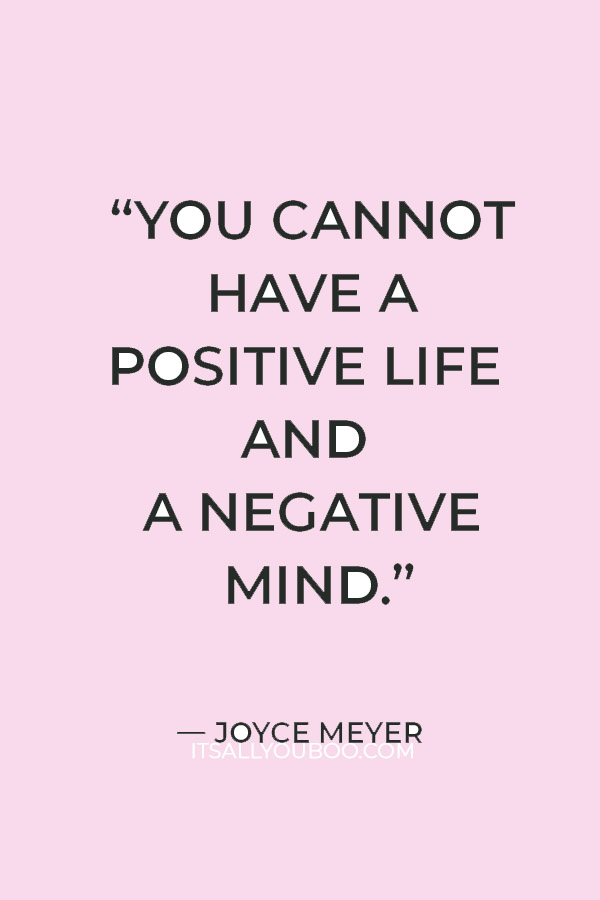
3 Ways To Stop Thinking Negatively About Yourself
The problem with negative thoughts comes when we dwell and ruminate, and let the thoughts take over our lives in detrimental ways.
It becomes difficult to even think about how to stop thinking negatively about yourself! There are just too many ways to indulge in the practice.
Fortunately, you’re not doomed to continually live with negative thinking patterns.
Happy Days Are Here Again
The first thing you need to understand is that it’s impossible to feel happy all the time. Just being human means you’ll experience emotions across the spectrum.
Sad. Lonely. Anxious. Fearful. Joyful. Excitement, love, anger. That’s life.
And there’s this: when you want something really, really bad and then you get it, you’re happy, right? But for how long? Very soon after, you’re already wishing and hoping for the “new” thing. Again, it’s how we’re made.
It doesn’t mean you’re selfish, or that you lack gratitude. It’s just human nature. And once you recognize these things for what they are, you’ll be equipped to deal with negative thoughts about yourself.
So the first tip to stop thinking negatively about yourself is to realize that negative thoughts aren’t always something you need to literally abolish (if that were possible).
In other words, you don’t want to think negatively about thinking negatively! You’ll get yourself stuck in a vicious cycle.
Now that you know what negative thinking patterns are, and why everyone has them, let’s find out what you can do about it. We’ll look at three ways to help you stop thinking negatively about yourself.
👉🏽 RELATED POST: How to Always Be Happy
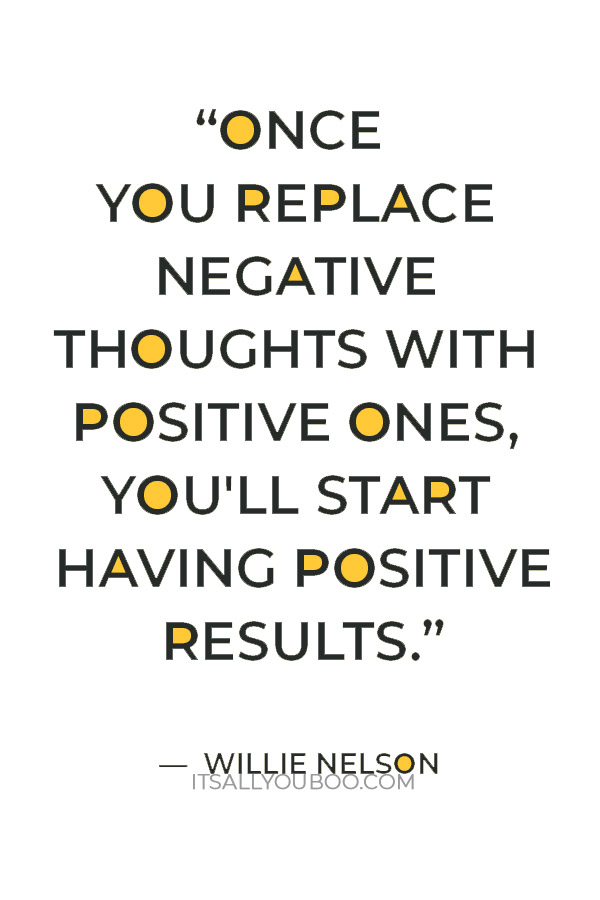
#1. Replacing Negative Thoughts
When you’re constantly thinking negative thoughts about yourself, it’s likely you’ll default to distraction.
The problem with this so-called solution is that first, it doesn’t get to the root of the problem, and second, often the distraction is eating, bingeing Netflix, or online shopping for things you don’t need.
The same negative thoughts will come out again, and then you’ll just go through the same process. Again.
One of the most often recommended ways to deal with negative thoughts is the replacement method.
The replacement method works like this:
- Write down negative thought (ex., I’m so fat)
- Think of a thought to replace it (ex., I have a body)
- Practice thinking the new (believable) thought
- Repeat until you no longer think “I’m fat,” and have replaced it with “I have a body.”
You can then move from your new, more neutral thoughts to more positive ones by going through the process again:
- Write down neutral thought (ex., I have a body)
- Think of a thought to replace it (ex., My body is useful for many things)
- Practice thinking the new (believable, somewhat positive) thought
- Repeat
You can repeat this process until you have a positive thought that replaces the original negative one. Perhaps something like, “My body helps me to accomplish many positive things daily.”
The replacement method works if you practice the new thoughts frequently. This is a very helpful way to catch yourself in the act of thinking negatively about yourself.
Truly, it’s something most of us do all the time and we’re rarely even aware of it. Using this method to catch yourself is effective, gentle, and kind.
It does require work and patience (as do all the methods), but the rewards are worth it.
👉🏽 RELATED POST: How To Train Your Subconscious Mind
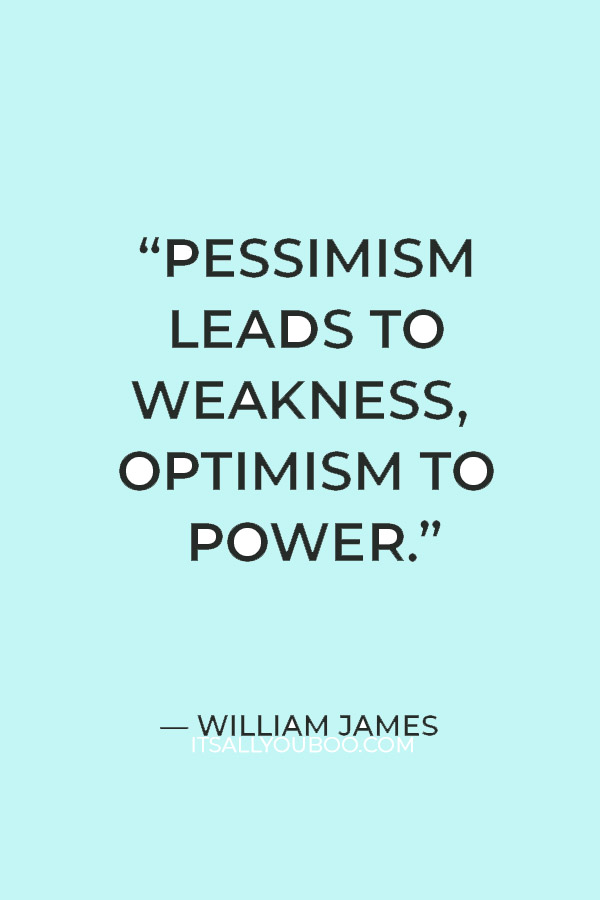
#2. Challenging Negative Thoughts
Once you’ve practiced with a negative thought and used the replacement method above, you can move on to the somewhat more involved, but ultimately a more effective method of challenging negative thoughts.
This method is adapted from and inspired by CBT or Cognitive Behavior Therapy.
CBT is based partly on the principles that, “psychological problems are based, in part, on faulty or unhelpful ways of thinking…[or] learned patterns of unhelpful behavior.”
Let’s say you frequently have the thought, “I can’t lose weight, I’m just too weak!”
To challenge this thought (which is really two thoughts stuck together), you can go through the following process:
- Write down the thought.
- Ask if the thought is absolutely true. Is there strong evidence for it?
- Is there any evidence against it? (recall from above that this is all or nothing thinking)
- If a friend told me this statement, what advice would I give her?
- Is this thought helpful?
Once you’ve gone through these questions with your negative thought, you’ll have a better grasp on whether or not this thinking is really, really true, and if it is true, is it helpful?
If not true, then you can practice saying that out loud or to yourself, and replace it with a more true thought.
If it’s true or partially true (at the moment), but not helpful, then you can use the third method to move toward thoughts and actions that move you forward toward your goals and values.
#3. Making Room For Negative Thoughts
In reality, you can’t totally STOP thinking negatively about yourself always and forever. Negative thoughts are hardwired into our very beings.
While it’s true that some people are genetically more inclined to negative thoughts, no one is completely immune.
Some people just deal with them more easily than others.
It’s also true that the first two methods are excellent ways to deal with negative thinking, but I believe making room for negative thinking is the most effective way in the long run.
Why? Because you’re no longer making negative thoughts into a bogeyman. Because really, they’re totally neutral.
It’s only your thoughts about the thoughts themselves that make them harmful to you.
What if, when the thought, “I’m such a total loser” popped into your head, you said (or thought) something like, “There’s that thought again! Seems to come up whenever I’m trying to do something new.”
Do you see how that can diffuse the situation? That’s because you’re distancing yourself from the thought, and not fusing with it.
You could even make up something funny, like, naming the “person” who says these things ….“There goes Negative Nelly again, always trying to rain on my parade!”
👉🏽 RELATED POST: Growth Mindset vs Fixed Mindset

Acceptance & Commitment Therapy (ACT)
The method described above is inspired by ACT, pronounced like the word “act.” It stands for Acceptance and Commitment Therapy.
ACT is, according to prominent proponent author Russ Harris, “the mindfulness-based program for reducing stress, overcoming fear, and creating a rich and meaningful life.”
That’s a pretty tall order, but with time and practice, it’s a game-changer, especially for those of us more prone to excessive negative thinking.
Other approaches, including challenge and replacement, rely more on trying to eliminate negative thoughts and stories (or at least distracting yourself from them) as if they’re something bad in and of themselves.
But in reality, they’re completely normal and they’ll always be with us.
Instead of having to fight with them (challenging) or trying to eliminate them (replacing), why not just let them be what they are…a thought in your head?
You can fuse with the thought (not good), or just treat it as a neutral story.
Dr. Harris calls this diffusing. Diffusing is a way to sort of stand apart from your thoughts and treat them as separate from you.
It’s Time To Stop Thinking Negatively About Yourself
There’s no doubt that negative thoughts about yourself will come up frequently. The question is, will you let them derail your goals and move you away from your values?
Or will you treat the thoughts like the neutral things they are, not necessarily facts, and certainly not things you must obey or act upon?
Instead of reaching into the refrigerator or cookie jar any time the “I’m such a loser fatso” thought pops into your head, take the time to diffuse and think, “oh, there’s the ‘I’m a loser’ story again!”
Be More Positive Affirmations
Ready to stop thinking so negatively and embrace positivity? Get your FREE 20 Printable Positive Affirmations to help you break negative thought patterns.
Then you can make an informed decision whether or not you believe this thought is helpful and moves you toward your values of, perhaps, good health and well-being, or moves you away from those values.
Tell the thought, “thank you thought, for trying to help, but I’ve got this!”
And maybe grab that apple instead!

How do you stop thinking negatively about yourself?

More About Guest Contributor
Kathy encourages women over 50 to be their very best and fittest selves, even when they think they’ve tried everything. She writes about mindset, diet, and fitness at phasetwofitness.com
Last Updated on February 13, 2025



